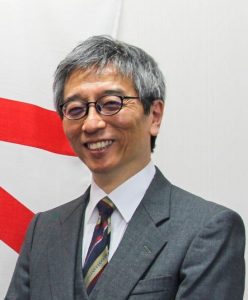Welcome from the Dean of the School, Graduate School and Faculty of Fisheries Sciences

TAKAGI Yasuaki Dean
Welcome to the website of the School, Graduate School and Faculty of Fisheries Sciences at Hokkaido University, where more than 600 undergraduate students and 200 graduate students are now studying fisheries and aquatic sciences.
Our university was founded as Sapporo Agricultural College in 1876. Its first Vice-Principal was Dr. William S. Clark, who famously told the students to “Be ambitious!”. Today, the university’s education system is based on four basic philosophies related to the ideals of Dr. Clark: Frontier Spirit, Global Perspectives, All-round Education, and Practical Learning. The School, Graduate School and Faculty of Fisheries Sciences have deeply inherited his ambition and ideals.
The fisheries school at Hokkaido University is the oldest in Japan. Fisheries science education began in Japan when Dr. John C. Cutter first taught fisheries in 1880. He influenced and inspired many young students including Kazutaka Ito, the founder of the Hokkaido Salmon Hatchery in Chitose in 1888; Kanzo Uchimura, whose graduation speech was entitled “Fisheries is one of the sciences”; Kingo Miyabe, who studied kelp along the Hokkaido coast; and Shosaku Sato, who became president of the Sapporo Agricultural School in 1894. Since the Department of Fisheries was established in 1907, it has produced about 15,000 graduates, many of whom have gone on to contribute to industrial and scientific development in broad fields related to fisheries and the ocean.
The ocean plays a critical role in supporting human well-being, from providing food and livelihoods and to regulating the global climate. For many years, it has been viewed as a limitless resource. But today, the ocean faces major threats, including climate change, pollution, habitat destruction, invasive species, and decreasing fish stocks.
Today at our schools, students and faculty members are trying to solve many of these problems by focusing their studies and research on sustainable and efficient use, as well as conservation of aquatic resources. Humans depend heavily on the ocean’s goods and services, and these needs will likely increase as the human population increases. The health of our oceans is critical to the fate of our planet.
I invite you to explore this website to learn more about the exciting learning environment at the School, Graduate School and Faculty of Fisheries Sciences.
With best regards,
